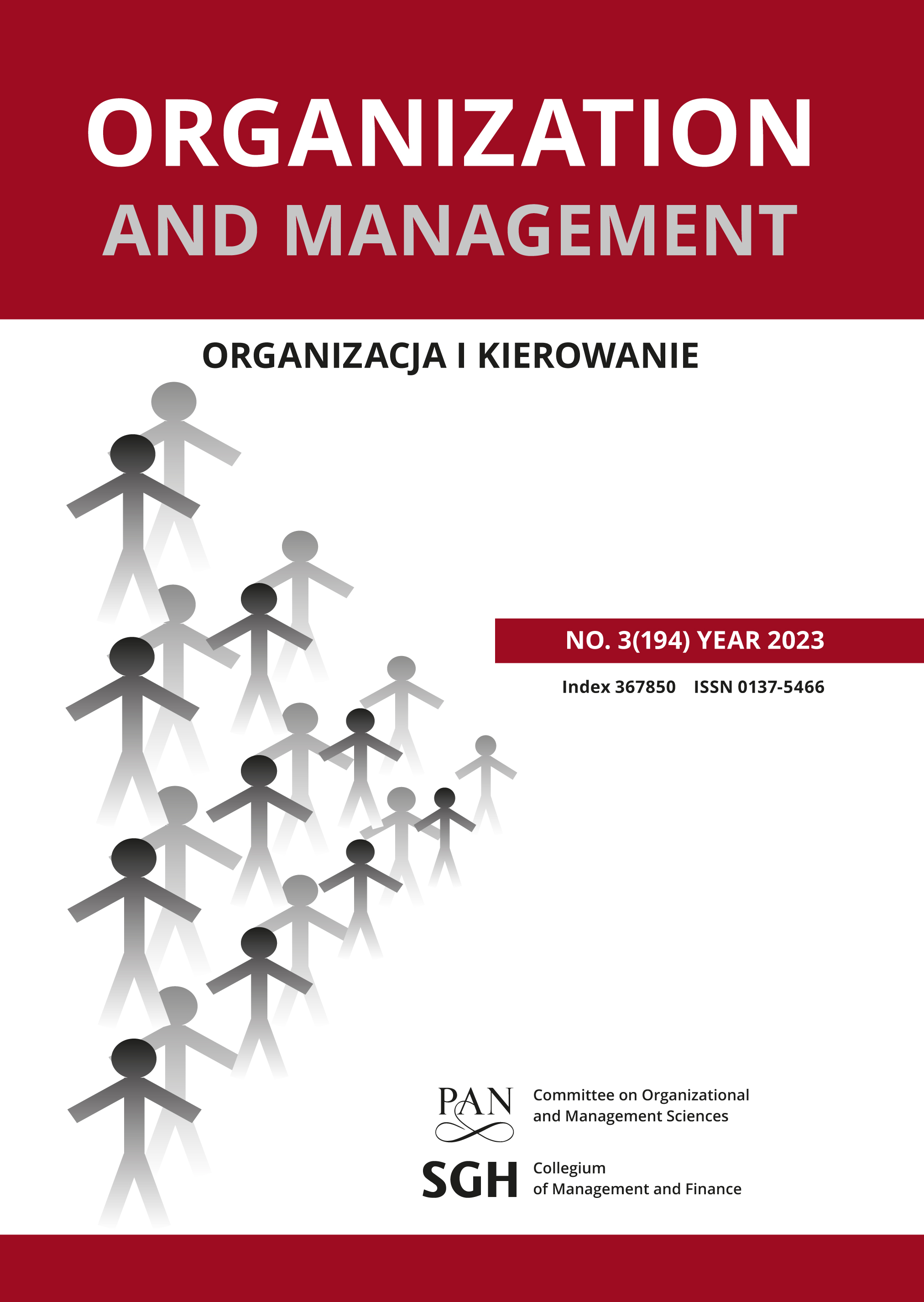W KIERUNKU DOJRZAŁEJ ELASTYCZNOŚCI – ORGANIZACYJNE KONSEKWENCJE ZMIANY TRYBU PRACY
Main Article Content
Abstrakt
Elastyczność organizacyjna jest jednym z czynników wymienianych wśród elementów niezbędnych dla budowania przewagi rynkowej. Jakkolwiek badania na ten temat są już dość silnie ugruntowane w obszarze studiów organizacyjnych, nigdy przed rokiem 2020 nie mieliśmy okazji do tak jednoznacznego obserwowania skutków swoistego wymuszenia elastyczności, jak w czasie pandemii COVID-19. Doświadczenia te pokazują, że właściwe projektowanie rozwiązań organizacyjnych wymaga wyciągnięcia wniosków z czasu pandemii i przyjrzenia się, jakie konsekwencje niesie za sobą zmiana. Celem niniejszego artykułu jest opis konsekwencji dla różnych trybów pracy (stacjonarna, zdalna, hybrydowa) oraz wyjaśnienie, jaka jest relacja między trybem pracy, a rodzajem konsekwencji doświadczanych przez pracowników. W pracy zaprezentowano wyniki badań własnych zrealizowanych w oparciu o sekwencyjną strategię eksploracyjną, które wykazały, iż w ramach poszczególnych trybów pracy charakterystyka konsekwencji jest zróżnicowana, a doświadczane przez pracowników konsekwencje różnią się w zależności od trybu pracy. Nie udało się natomiast jednoznacznie wskazać, które konsekwencje mają charakter specyficzne dla konkretnego trybu pracy, co stało się przesłanką do opisu ich w kategoriach konsekwencji niespecyficznych.
Article Details
Bibliografia
Amis J., Greenwood R. [2021], Organizational change in a (post-) pandemic world: Rediscovering interests and values, Journal of Management Studies 58 (2): 382–386.
Becker F. [2002], Improving organizational performance by exploiting workplace flexibility, Journal of Facilities Management 1 (2): 154–162.
Creswell J. W. [1999], Mixed-method research: Introduction and application, in: Cizek G. J. (ed.), Handbook of educational policy, Academic Press, Cambridge: 455–472.
Dewalska-Opitek A. D., Velez Nunez R. [2022], New challenges in employee relationships in the digitalised post-pandemic organizational culture, Journal of Modern Science 49 (2): 253–274.
Green N., Tappin D., Bentley T. [2020], Working from home before, during and after the Covid-19 pandemic: Implications for workers and organizations, New Zealand Journal of Employment Relations 45 (2): 5–16.
Januszkiewicz K. [2015], Od teorii naukowych do badania empirycznego – budowa narzędzi do badania zachowań ludzi w organizacji, Przegląd Organizacji (12): 37–42.
Januszkiewicz K., Świątek-Barylska I. [2021], The Work-Life Interface in a Situation of Forced Employee Flexibility, Human Resource Management/Zarządzanie Zasobami Ludzkimi 1/2: 135–149.
Kalleberg A. L., Rasell E., Cassirer N., Reskin B. F., Hudson K., Webster D., Spalter-Roth R. M. [1997], Nonstandard work, substandard jobs. Flexible work arrangements in the US. Economic Policy Institute, Washington, DC.
Koszel M. [2020], Pandemia COVID-19 a rynek nieruchomości w Polsce. In Tendencje rozwoju współczesnego rynku nieruchomości mieszkaniowych, Wydawnictwo Uniwersytetu Ekonomicznego w Poznaniu, Poznań.
Łaszka J. (ed.) [2021], Raport NBP, Raport o sytuacji na rynku nieruchomości mieszkaniowych i komercyjnych w Polsce w 2020 r., https://archiwum.nbp.pl/publikacje/rynek_nieruchomosci/raport_2020.pdf (dostęp: 25.05.2023).
MacEachen E., Polzer J., Clarke J. [2008], „You are free to set your own hours”: Governing worker productivity and health through flexibility and resilience, Social Science & Medicine 66 (5): 1019–1033.
Mierzejewska K., Chomicki M. [2020], Psychospołeczne aspekty pracy zdalnej. Wyniki badań przeprowadzonych w trakcie trwania pandemii COVID-19, Zeszyty Naukowe Uniwersytetu Ekonomicznego w Krakowie/Cracow Review of Economics and Management 3 (987): 31–44.
Ozimek A. [2020], The future of remote work, Available at SSRN 3638597.
Papalexandris N., Kramar R. [1997], Flexible working patterns: towards reconciliation of family and work, Employee relations 19 (6): 1–14.
Popovici V., Popovici A. L. [2020], Remote work revolution: Current opportunities and challenges for organizations, Ovidius University Annals: Economic Sciences Series 20:468–472.
Scardamalia M., Bereiter C. [2014], Smart technology for self-organizing processes, Smart Learning Environments 11: 10.
Sęczkowska K. [2019], Konsekwencje psychospołeczne pracy zdalnej, Problemy Nauk Humanistycznych i Społecznych (2): 10–16.
Stefańska M., Grabowski G. [2023], Zaangażowanie pracowników a satysfakcja z pracy w warunkach pracy zdalnej, e-mentor 98 (1), 13–21.
Zalega T. [2009], Praca zdalna – obraz przemian w Polsce i wybranych krajach Unii Europejskiej, Master of Business Administration 17 (4): 35–45.
